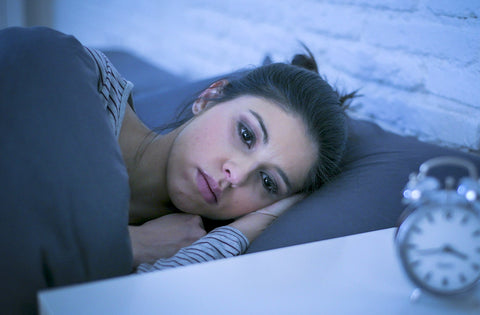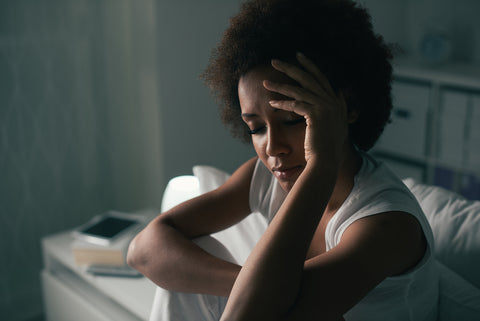If you're the parent of a child with autism or sensory processing disorder, you may have heard about weighted blankets. But did you know that weighted blankets may also address the specific health needs of women? Certain health conditions disproportionately affect women, and statistics show that women are at a higher risk of developing serious health problems due to stress and anxiety.
From fibromyalgia to restless leg syndrome, there are many ways a weighted blanket may help you or the women in your life sleep better, feel more relaxed and experience less pain. Here are six ways a weighted blanket may help women.

Can a Weighted Blanket Help Fibromyalgia?
Fibromyalgia is a disease with a massive gender imbalance. Up to 90 percent of all fibromyalgia sufferers are women, and women usually present with more severe symptoms than men. While men with fibromyalgia tend to experience milder and shorter symptoms, women typically feel more pain and endure symptoms for longer periods of time.
According to Dr. Tarvez Tucker, an associate professor of neurology and a fibromyalgia expert, “While women typically experience tenderness or pain in at least 11 of 18 tender points, men may have only six places in the body that are tender, and they aren’t as painful as those in women patients.”
While doctors aren’t completely certain why fibromyalgia strikes more women, some theorize that estrogen may play a role. In many fibromyalgia sufferers, symptoms peak during the reproductive years, when estrogen levels are at their highest. During a woman’s menstrual cycle, estrogen climbs steadily and then drops sharply just before a woman’s monthly period. Health experts say this might explain why fibromyalgia symptoms seem to come on with sudden intensity in female patients.
Widespread, generalized pain makes fibromyalgia a debilitating disease for many women. This is where a weighted blanket may help. Made with about 10 percent of the user’s body weight, a weighted blanket works by applying deep touch pressure stimulation — a therapy technique that applies firm but gentle pressure on the body. This firm, consistent and gentle pressure may ease pain and help alleviate the fatigue and discomfort of fibromyalgia. At SensaCalm, we hear from many fibromyalgia sufferers who say they’ll never go back to regular blankets and bedding.
The Benefits of Weighted Blankets for Restless Leg Syndrome
Like fibromyalgia, restless leg syndrome affects more women than men. While up to 10 percent of the U.S. population may suffer from restless leg syndrome, the National Institute of Neurological Disorders and Stroke states that women are more likely than men to develop the condition.
Characterized by unpleasant or uncomfortable tingling or prickling sensations in the legs, restless leg syndrome — which is also known as Willis-Ekbom Disease — tends to occur more often at night. Without treatment, it can lead to a 20 percent decrease in work productivity. The discomforts associated with restless leg syndrome can also cause sufferers to become depressed and anxious, and many find it difficult to travel.
Deep pressure touch stimulation is best described as a full-body hug. While you can get the benefits through gentle massage, it’s usually impractical (if not impossible) to get a lengthy massage on a regular basis.
Does a weighted blanket help restless leg syndrome? It just might! At SensaCalm, we hear from many women who prefer to use a weighted blanket to help alleviate the symptoms of restless leg syndrome. With weight on the legs, sufferers get the benefits of deep touch pressure therapy anytime and anywhere they choose. And if you’re on the go or in the office, you can try a weighted lap pad.
A Weighted Blanket Might Help With Stress

Stress affects a big portion of the population, but women are more likely to suffer chronic stress compared to men. Just how much, you ask? Experts say women are two times as likely as men to suffer major depression and three times as likely to experience an anxiety disorder.
Worse, this rise in stress is taking a toll on women’s health. According to the American Psychological Association, stress is up in a big way. APA Chief Executive Officer Norman B. Anderson, PhD states, “American is at a critical crossroads when it comes to stress and our health.”
Heart disease is one of the most serious health conditions associated with elevated stress levels. In fact, heart disease is the number one killer in America, as well as the leading cause of death in women. When you’re stressed, your cortisol levels rise, and cortisol has been linked to a host of health problems, including heart attack, stroke and high blood pressure.
Everyone has their preferred methods of de-stressing and practicing self-care. With stress on the rise, it has never been more important to take a timeout from daily stressors like work, family obligations and even seemingly mundane tasks like staying on top of the laundry and other household chores.
Research has shown that weighted blankets can actually reduce the physiological manifestations of stress. In a study published in the journal of Occupational Therapy in Mental Health, study participants who used a weighted blanket had lower blood pressure and pulse rate readings. Additionally, 63 percent of people in the study said they felt less anxious after using a weighted blanket, and 78 percent “preferred the weighted blanket as a calming modality.”
Soothing Away Anxiety with a Weighted Blanket
While stress and anxiety share many common traits, there is a difference between stress and conditions known as “anxiety disorders.” The American Psychiatric Association explains that anxiety disorders like panic disorder and generalized anxiety disorder “differ from normal feelings of nervousness or anxiousness, and involve excessive fear or anxiety.”
According to the Anxiety and Depression Association of America, “From the time a girl reaches puberty until about the age of 50, she is twice as likely to have an anxiety disorder as a man. Anxiety disorders also occur earlier in women than in men.”
Researchers believe the anxiety gender gap may have something to do with brain chemistry and fluctuations in hormone levels. Specifically, rising and falling estrogen may be partly to blame for higher incidences of anxiety in girls and women.
As with stress, a weighted blanket may be able to help ease the symptoms of anxiety. Whether it’s sleeping better at night or just relaxing in the evenings, the calming effect of a weighted blanket may help women who experience anxiety experience fewer symptoms and get more restorative sleep.
Multiple Sclerosis Symptoms and Weighted Blankets

Over 2.3 million people in the world suffer with multiple sclerosis, which is a chronic disease of the central nervous system. When someone has MS, the body’s immune system attacks the myelin sheath that covers the nerves. Symptoms can be debilitating and include blurred vision, loss of balance and muscle control, tremors, slurred speech, fatigue, poor memory, blindness and difficulty concentrating.
Like many other health problems, multiple sclerosis affects a disportionately high number of women compared to men. According to the National Multiple Sclerosis Society, “more than two to three times as many women as men develop MS and this gender difference has been increasing over the past 50 years.”
For years, therapists have recommended weighted blankets for a broad range of conditions, including multiple sclerosis. Multiple sclerosis patients also frequently recommend weighted blankets to fellow MS sufferers.
While multiple sclerosis has no cure, there are several difficult medications and lifestyle changes that have been shown to help alleviate the symptoms. A weighted blanket may be able to help multiple sclerosis patients sleep better, which can alleviate some of the fatigue and “brain fog” many patients report.
Insomnia, Sleep and Sleeping Bags
If you suffer from insomnia, you know firsthand how frustrating and debilitating it can be. You’re exhausted and tired, but your brain simply refuses to quiet down and sleep. Or maybe you wake up in the middle of the night and have trouble getting back to bed. While over the counter sleep aids and prescription medications may help, many people dislike the side effects and prefer a natural alternative.
According to the U.S. Department of Health and Human Services, one in four women has some form of insomnia. When you consistently fail to get the sleep you need, it can have a far-reaching impact on your life. “Chronic insomnia can affect your ability to do daily tasks like working, going to school, or caring for yourself.” The HHS goes on to state that older women are particularly prone to insomnia.
If you have ever nodded off under a warm down comforter in the middle of winter, or you love the soothing weight of a heavy sleeping bag, you’ve likely already encountered the benefits of a weighted blanket.
Far from being restrictive or confining, weighted blankets provide the firm and gentle pressure of a hug. According to Dr. Raj Dasgupta, an assistant professor of clinical medicine and a spokesman for the American Academy of Sleep Medicine, weighted blankets may help people sleep better. “It’s like having the best hug for a long period of time” and could be “a good alternative to life-long sedative hypnotic medications (sleeping pills) at night.”
What’s not to love about that?
Get Better Sleep with a SensaCalm Weighted Blanket
At SensaCalm, we make weighted blankets that may help a wide range of health concerns, including conditions that typically affect women. Take a look at our custom order page to see our wide range of solid and pattern fabrics. Want your weighted blanket ASAP? Check out our line of finished blankets that ship the next business day after your order.
We welcome your questions! Get in touch by calling us at 855-736-7222, or use our online contact form to speak to one of our knowledgeable team members.
Disclaimer: The content on this website is not intended as a substitute for medical advice. Talk to your doctor or healthcare provider before undertaking any type of therapy or treatment.


